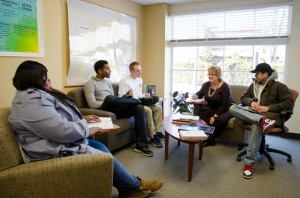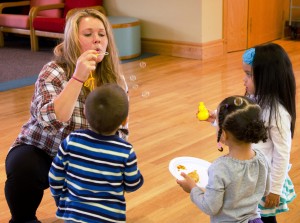Students Promote Easton Shelter and Mentoring Program through Film, Photos, and Words
By Shehtaz Huq ’14
Alec Golini ’14 (Lumberton, N.J.) has had a close connection with the Easton community during his time on College Hill.
A government and law major and member of the men’s soccer team, Golini founded Athletes C.A.R.E. (Creating Abundant Relief Effort), which engages athletes and young people in the community to provide food, clothes, and necessities to the homeless. The organization’s most recent project raised $6,000 for Roofover, a shelter run by Easton Area Neighborhood Center (EANC) that provides housing and case management services to homeless families with children.

Deja Washington ’14, Brandon Turner ’14, Alec Golini ’14, Professor Deborah Byrd, and Fredy Flores ’14 discuss their work with the Easton Area Neighborhood Center.
The success with the Roofover fundraiser led to Golini connecting with professor Deborah Byrd, a member of EANC’s Board of Directors, on projects that will benefit two of the agency’s programs. The multidisciplinary effort is supported by the College’s new Center for Innovation, Design, Entrepreneurship, and Leadership (IDEAL), which aims to foster more collaborative interdisciplinary work among students, professors, and in this case, community partners.
Golini and fellow students have embarked on a 14-week endeavor to produce both a documentary film about the Roofover program and its residents, and a photo narrative book featuring stories by young people in EANC’s ASPIRE mentoring and support program for pregnant and parenting teens.
He’s joined by film and media studies major Fredy Flores ’14 (Falls Church, Va.), economics major Brandon Turner ’14 (Bay Shore, N.Y.), and anthropology & sociology and women’s & gender studies double major Deja Washington ’14 (New York, N.Y.)
“Our documentary and photo narrative address teenage parenting and homeless shelters and explore some of the deeper concerns that lead to issues such as single parenthood and homelessness,” Turner says.
Byrd explains, “Homelessness is less often due to personal failings than to widespread social problems such as domestic violence, child abuse, lack of healthcare, inequities in our country’s educational system, and declining wages and opportunities for upward mobility for people without college degrees,” she says.
The students had to win the families’ trust.

Students met with local teen moms and their children to collect letters, images, and stories for the photo narrative book.
“Through personal interviews and informal discussions, the students learned firsthand how to turn these individuals into the subjects of the film and photo narrative without treating this community as a social laboratory,” Byrd says.
Washington organized group sessions with the young mothers to learn their stories and accurately reflect the challenges they face. She was well-suited for this work after taking Byrd’s community-based learning course Single Motherhood, then completing an internship that focused on helping ASPIRE participants and staff.